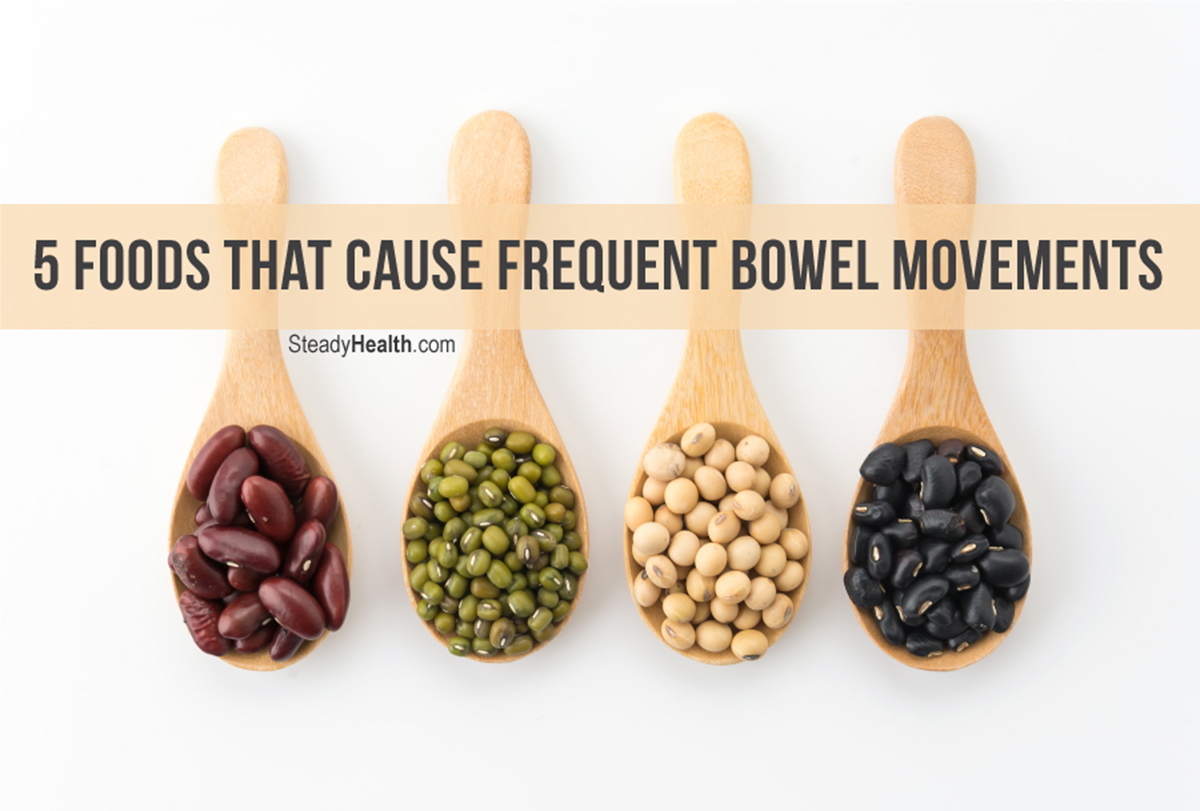One of the potential causes of frequent bowel movements can, unsurprisingly, be found in the foods that we eat. A person's diet has a significant influence on the intestinal health of a patient [1]. Foods packed with nutrients and fiber are healthy foods that we should eat on a daily basis. However, diets in modern times have shifted to the convenience of fast food and takeaways, with vegetables often taking a back seat when it comes to dinner choices.
This change in diet can lead to short-term health complications like chronic constipation or long-term complications like diverticulosis [2]. Here, I will highlight the foods that can increase stool production and those you should choose to have on your plate to make sure you have regular bowel movements. Be careful, though, because these same foods can lead to frequent bowel movements and they can quickly switch you to another extreme.

Legumes help you have healthy bowel movements
The first category of foods that are likely to increase your bowel movements will be legumes: peas, beans, and lentils. They are all full of fiber and other nutrients that will make you go to the bathroom more frequently, potentially liberating you from constipation. Fiber is essential in our diet because it helps move material through the intestines.
Fiber is a compound that we do not digest so you will not get much concerning nutrients when you opt for a fiber-rich diet. However, you should think of fiber as a lubricant, similar to what you would use for the engine in your car. As we get older, the pipes in your "car" will not work as efficiently as when it was brand new, and you will need to take more and more care of the engine to still be able to drive. Fiber does the same thing for our intestines. If we routinely eat heavy meals with little to no fiber, eventually, a log-jam of food begins to build in the intestine. This dense food requires extra time to digest and they are the reason you are constipated soon afterward.
This is not the end of the story, however, because not only will you have short-term complications from low fiber diets, long-term risks are also possible. When it comes to long-standing constipation, the muscles lining your intestine to help propel the food forward will actually begin to weaken and even collapse in some situations. When these pouches occur, you are diagnosed with a condition called diverticulosis [3].
It is possible for food to be trapped in the cavities and lead to future infections, so it is in your best interest to eat fiber regularly to prevent these serious health complications when you are older. Legumes are believed to have between 5 to 16 grams of fiber per serving and represent one of the essential foods that will increase your bowel movement habits. There is also a risk of having colorectal cancer from a deficiency of fiber, so eat up! [4]
Vegetables to speed your digestive tract along
As you could imagine, vegetables are foods sources that are teeming with fibers. As such, a multitude of vegetables can also help promote increased bowel habits as well as the formation of healthy, solid, stools. Some of the vegetables with a higher concentrations of fibers would be broccoli, spinach, artichokes and Brussels sprouts. For example, an artichoke can have more than 10 grams of fiber per serving. Routinely dining on this food will lead to more frequent bowel movements.
Fruits for fiber!
If vegetables are foods you have a tendency to avoid, luckily for you, fruits are also a potentially viable option for you to get your daily allotment of fiber. Fruits like apples, bananas, raspberries, pears, prunes, and blackberries all have an appreciable amount of fiber in their anatomy and will increase your bowel activity. [5] You will definitely notice that these foods increase stool production if you routinely eat them.
Grains are good for your digestive tract
Whole grains are some of the most fiber-dense foods that you can find, and eating them often will definitely increase your trips to the bathroom. Foods like oatmeal, whole-wheat bread, bran-flakes and even popcorn are all potential sources of fiber. They all represent a great snack food that you can eat at any time of the day. Certain cereals can have over 5 grams of fiber per serving so you can ensure you are reaching your daily intake goal of fiber.
Women are recommended to eat at least 25 grams of fiber per day while men are advised to eat at least 35 grams a day. Yes, you will need to put in a significant effort every day to meet these daily targets [6].
Natural Supplements
When it comes to our last category to cover here, we will examine some of the natural supplements that people can commonly take that may also inadvertently increase your stool production. These could be compounds like flax seed oil or aloe vera. These are both commonly used in the athletic world to help speed recovery and give a person vital nutrients but they are also known in the medical world as natural laxatives.
In conclusion, all of the foods we all know to be healthy — fresh vegetables, fruits, and whole grains — also play an essential role in helping your intestines work smoothly. If you have recently been constipated and are "guilty" of eating too many fast foods, a lack of fiber is a likely culprit. If you spend a few weeks eating the foods your grandmother would have advised you to, you'll almost certainly notice a big difference.
- Photo courtesy of SteadyHealth.com


Your thoughts on this